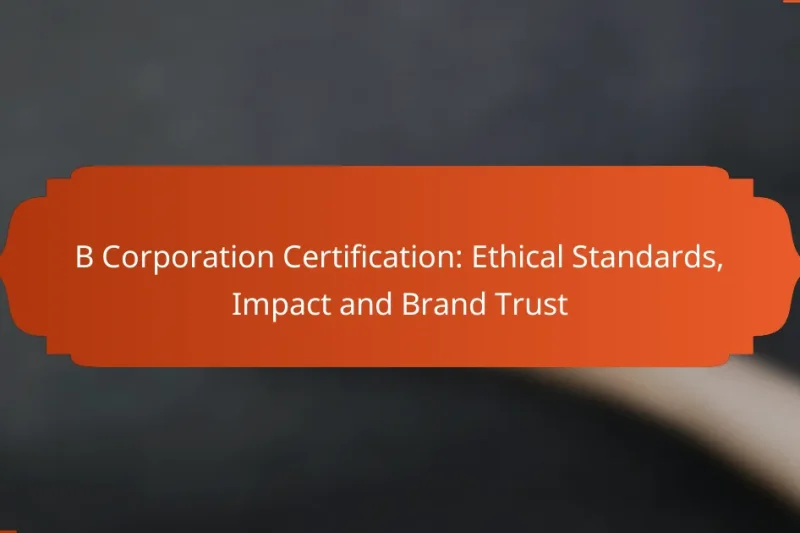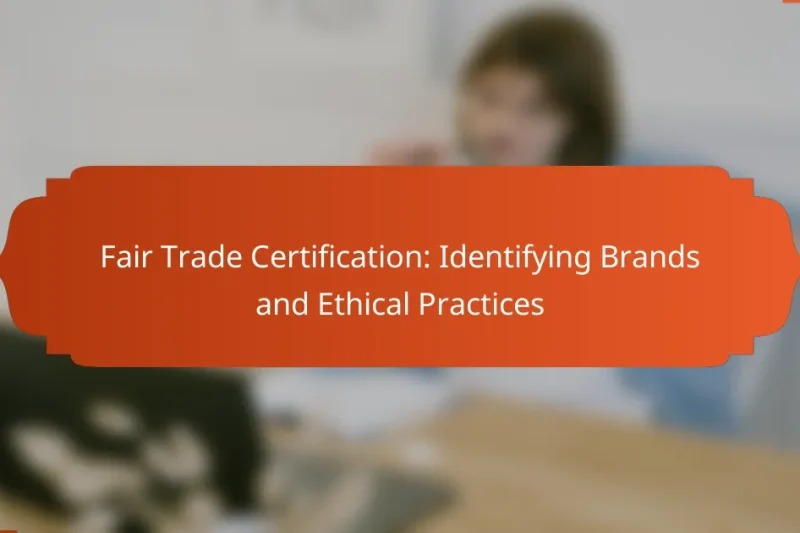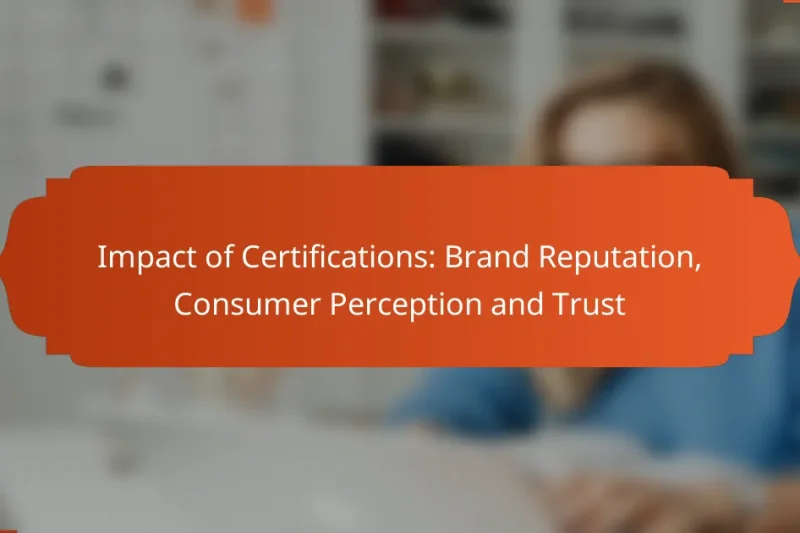Sustainability certifications play a crucial role in e-commerce by assuring consumers that products adhere to specific … Sustainability Certifications: Building Trust and Brand LoyaltyRead more
Key Certifications for Sustainable Fashion
Key certifications for sustainable fashion play a crucial role in guiding consumers towards products that adhere to specific environmental and social standards. By ensuring responsible sourcing, ethical production processes, and fair labor practices, these certifications empower shoppers to make informed choices and support brands committed to sustainability.
Sustainable Fashion Certifications: Informed Purchases and Consumer Benefits
Sustainable fashion certifications empower consumers to make informed purchasing decisions by ensuring that products adhere to … Sustainable Fashion Certifications: Informed Purchases and Consumer BenefitsRead more
GOTS Certification: Benefits, Standards and Eco-Conscious Choices
The Global Organic Textile Standard (GOTS) certification is a hallmark of quality that emphasizes environmental sustainability … GOTS Certification: Benefits, Standards and Eco-Conscious ChoicesRead more
B Corporation Certification: Ethical Standards, Impact and Brand Trust
B Corporation Certification is a powerful tool for businesses seeking to enhance their brand trust by … B Corporation Certification: Ethical Standards, Impact and Brand TrustRead more
Fair Trade Certification: Identifying Brands and Ethical Practices
Fair Trade certification plays a crucial role in promoting ethical practices in trade by ensuring that … Fair Trade Certification: Identifying Brands and Ethical PracticesRead more
Impact of Certifications: Brand Reputation, Consumer Perception and Trust
Certifications play a vital role in shaping brand reputation and consumer trust in the e-commerce landscape. … Impact of Certifications: Brand Reputation, Consumer Perception and TrustRead more
OEKO-TEX Certification: Chemical Safety, Standards and Consumer Assurance
OEKO-TEX Certification is an internationally recognized standard that guarantees textiles and leather products are free from … OEKO-TEX Certification: Chemical Safety, Standards and Consumer AssuranceRead more
What are the key certifications for sustainable fashion?
Key certifications for sustainable fashion help consumers identify products that meet specific environmental and social standards. These certifications ensure that materials are sourced responsibly, production processes are ethical, and labor practices uphold workers’ rights.
Global Organic Textile Standard (GOTS)
The Global Organic Textile Standard (GOTS) is a leading textile processing standard for organic fibers. It covers the entire supply chain, from harvesting raw materials to manufacturing and labeling, ensuring that at least 70% of the textile is made from organic fibers.
To achieve GOTS certification, companies must comply with strict environmental and social criteria, including the prohibition of harmful chemicals and adherence to fair labor practices. Brands can display the GOTS logo on their products, signaling their commitment to sustainability.
OEKO-TEX Standard 100
OEKO-TEX Standard 100 is a certification that tests textiles for harmful substances. Products certified under this standard are free from chemicals that could pose risks to human health, making it a popular choice for consumers concerned about safety.
The certification process involves rigorous testing of each component of the textile, including dyes and accessories. Brands can use the OEKO-TEX label to assure customers that their products meet high safety standards.
Fair Trade Certified
Fair Trade Certified products ensure that producers receive fair compensation and work under safe conditions. This certification focuses on social equity, environmental sustainability, and economic empowerment for workers in developing countries.
To be Fair Trade Certified, brands must adhere to specific criteria, including fair wages, safe working conditions, and community development initiatives. This certification helps consumers support ethical practices in the fashion industry.
Cradle to Cradle Certified
Cradle to Cradle Certified focuses on the lifecycle of a product, promoting a circular economy. This certification evaluates products based on material health, material reutilization, renewable energy use, water stewardship, and social fairness.
Brands seeking this certification must demonstrate that their products can be safely returned to the environment or reused. This approach encourages innovation in sustainable design and manufacturing practices.
Responsible Wool Standard (RWS)
The Responsible Wool Standard (RWS) ensures that wool comes from farms that prioritize animal welfare and sustainable land management. This certification addresses concerns about the treatment of sheep and the environmental impact of wool production.
To achieve RWS certification, farms must adhere to strict animal welfare practices and demonstrate responsible land use. Brands can highlight this certification to show their commitment to ethical sourcing and environmental stewardship in their wool products.
How do these certifications impact consumer choices?
Certifications in sustainable fashion significantly influence consumer choices by providing assurance about the ethical and environmental practices of brands. Shoppers are increasingly seeking transparency and accountability, making these certifications a key factor in their purchasing decisions.
Increased trust in brands
Certifications enhance consumer trust by verifying that brands adhere to specific environmental and social standards. For instance, certifications like GOTS (Global Organic Textile Standard) or Fair Trade signal that products meet rigorous criteria for sustainability and ethical labor practices.
When consumers see these labels, they feel more confident in their purchases, knowing that they are supporting responsible companies. This trust can lead to brand loyalty, as customers are more likely to return to brands that demonstrate a commitment to sustainability.
Influence on purchasing decisions
Certifications can directly influence purchasing decisions by acting as a deciding factor for many consumers. A survey might reveal that a significant portion of shoppers prioritize certified products over non-certified ones, especially in markets where eco-consciousness is growing.
For example, a brand with a recognized certification may see a sales increase of 20-30% compared to similar products without certification. Consumers often use certifications as a quick reference to identify sustainable options, making them more likely to choose certified items over others.
What are the benefits of certified sustainable fashion?
Certified sustainable fashion offers numerous advantages, including reduced environmental impact and enhanced social equity. These certifications help consumers make informed choices while encouraging brands to adopt more responsible practices.
Environmental protection
Certified sustainable fashion significantly contributes to environmental protection by promoting eco-friendly materials and processes. Brands often use organic cotton, recycled fabrics, and non-toxic dyes, which minimize pollution and resource depletion.
For instance, certifications like Global Organic Textile Standard (GOTS) ensure that textiles are produced with a minimal ecological footprint. By choosing certified products, consumers support practices that reduce carbon emissions and waste.
Social responsibility
Social responsibility is a key aspect of certified sustainable fashion, focusing on fair labor practices and community welfare. Certifications such as Fair Trade guarantee that workers receive fair wages and work in safe conditions, fostering a more equitable industry.
Brands that adhere to these standards often engage in community development initiatives, enhancing the livelihoods of those involved in the supply chain. This commitment to social equity attracts consumers who prioritize ethical considerations in their purchasing decisions.
Market differentiation
Certification in sustainable fashion provides market differentiation, helping brands stand out in a crowded marketplace. As consumers become more environmentally conscious, brands with recognized certifications can attract a loyal customer base willing to pay a premium for sustainable products.
For example, brands that display certifications like OEKO-TEX or B Corp can leverage these credentials in marketing campaigns, emphasizing their commitment to sustainability. This differentiation not only enhances brand reputation but can also lead to increased sales and customer retention.
How can brands achieve these certifications?
Brands can achieve sustainable fashion certifications by adhering to specific guidelines and standards set by recognized organizations. This process typically involves demonstrating compliance with environmental, social, and ethical practices throughout their supply chain.
Understanding certification requirements
Each certification has unique requirements that brands must meet to qualify. For instance, certifications like GOTS (Global Organic Textile Standard) require a certain percentage of organic fibers, while Fair Trade certifications focus on equitable labor practices. Brands should thoroughly review the criteria for each certification to ensure alignment with their practices.
Common requirements often include documentation of sourcing materials, transparency in production processes, and adherence to labor rights. Brands should prepare to provide evidence of compliance through audits and reports.
Implementing sustainable practices
To achieve certifications, brands must implement sustainable practices across their operations. This can include using eco-friendly materials, reducing waste, and ensuring ethical labor conditions. For example, brands can switch to organic cotton or recycled polyester to meet material standards.
Additionally, brands should focus on energy-efficient production methods and sustainable packaging solutions. Regularly assessing and updating these practices is crucial for maintaining compliance with certification standards.
Engaging with certifying bodies
Engagement with certifying bodies is essential for brands seeking certification. This involves open communication to understand the certification process, timelines, and any specific documentation needed. Brands should establish a relationship with these organizations to facilitate smoother audits and assessments.
Participating in workshops or training sessions offered by certifying bodies can also be beneficial. These opportunities provide insights into best practices and help brands stay updated on evolving standards in sustainable fashion.
What are the challenges in obtaining sustainable fashion certifications?
Obtaining sustainable fashion certifications involves various challenges that can hinder brands from achieving their sustainability goals. Key issues include the high costs associated with certification and the complex compliance requirements that must be met.
Cost of certification
The cost of certification can be a significant barrier for many fashion brands, especially small and medium-sized enterprises. Certification fees can range from a few hundred to several thousand dollars, depending on the standard and the scope of the audit required.
In addition to direct certification fees, brands may incur additional costs for necessary changes to their supply chain, materials, and processes to meet certification standards. Budgeting for these expenses is crucial to ensure that the certification process does not become financially burdensome.
Complexity of compliance
Compliance with sustainable fashion certification standards often requires a thorough understanding of various regulations and practices. Brands must navigate complex documentation, supply chain transparency, and environmental impact assessments, which can be overwhelming.
To simplify compliance, brands should consider developing a clear action plan that outlines the steps needed to meet certification requirements. Engaging with consultants or industry experts can also provide valuable guidance and help streamline the process, reducing the risk of non-compliance.






